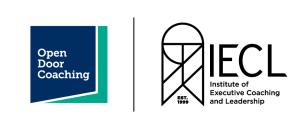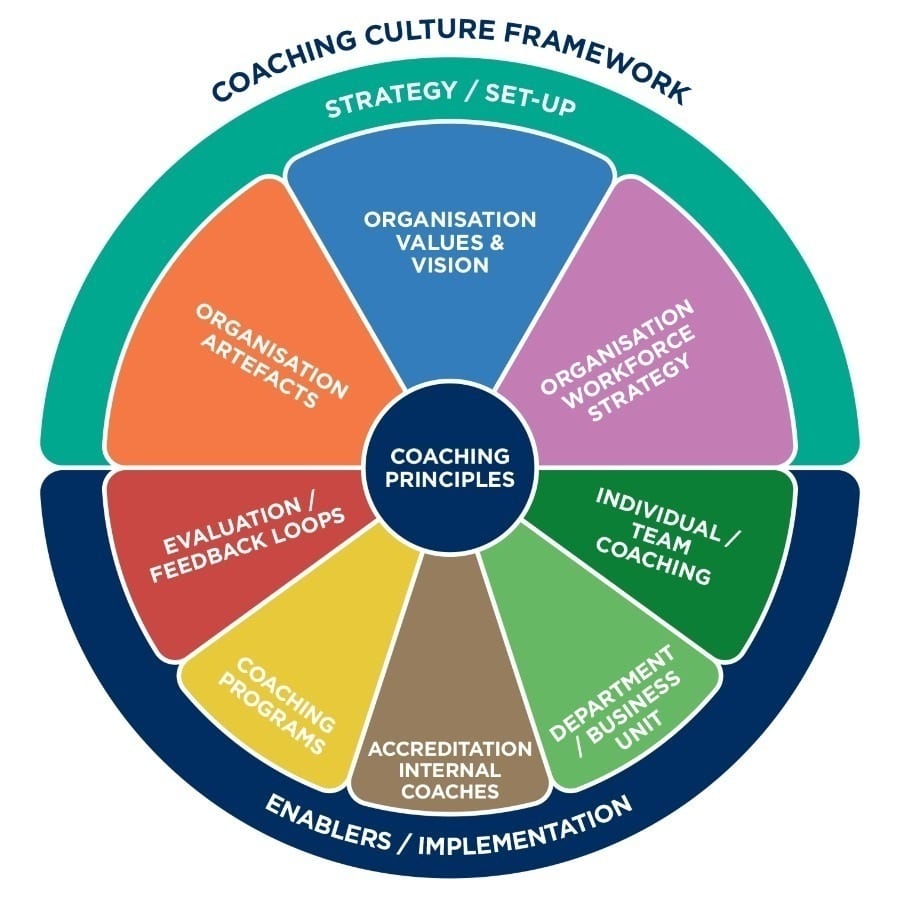What is a coaching culture?
Importantly, when we think about building a coaching culture, we think about ‘the way we do things around here.’
Culture (the way we do things around here) + Coaching = Coaching Culture.
Specially, we define coaching culture as: ‘the majority of people in the organisation using coaching techniques and principles’. Importantly, this includes: strong listening and questioning skills, to bring out the best in individuals and teams. In addition, the coaching approach is the common way of engaging in conversations. In contrast to telling people what to do, giving advice, mentoring and other techniques.
Interestingly, coaching is not the only technique or methodology used organisations. Likewise, it is not the only methodology or management/leadership tool appropriate in all situations. However, when the coaching principles and coaching tools are actively used, we can start to see this permeate the culture of an organisation.
Why is developing coaching skills important?
Developing coaching skills in the workplace has become increasingly important because:
- Organisations are calling on people to deliver more with less resources;
- Furthermore, managers have great technical skills but are lacking in the people skills;
- In addition, managers are taking on too much, and have less and less time;
- Importantly, we want people to be motivated and engaged at work;
- In order to grow and develop we need to be tapping the potential of people;
- We spend all our time at work, why not have a workplace that we actually enjoy.
CULTURE (the way we do things around here) + COACHING = COACHING CULTURE
The Coaching Culture FrameworkTM
There are two parts to the Coaching Culture FrameworkTM: the Strategy and Setup and the Enablers. The lower half of the diagram (enablers) underpins the top half (strategy).
The Strategy (top half of the document) are those elements that need to be considered when laying out the strategy or setup up for coaching in the Organisation.
This includes:
- Alignment to the Organisation goals/values/vision;
- Links to the Workforce strategy;
- Deciding coaching tools and methodology; and
- Designing Organisation artefacts (the visual signs of coaching).
The Enablers are those elements that underpin the Strategy. They enable the implementation of the Strategy. The Enablers include:
- Individual and team coaching;
- Department/business unit rollout;
- Accreditation of internal coaches;
- Coaching programs that expose a wide variety of people to coaching skills; and
- A method for evaluation and feedback on the implementation.
Note: The Coaching Culture FrameworkTM is copyright Open Door Coaching Technologies Pty Ltd and must not be reproduced without permission. Contact us for more information.
What is the trend?
There are many leaders in Australia who are transforming their organisations by introducing coaching. They have embarked on the journey to create a culture where coaching is normal. In addition, coaching is accepted and the preferred way of having conversations. Consequently, the word ‘preferred’ is a really important one. When it is a person’s preference to use coaching skills we see that person:
- ask questions rather than giving solutions;
- hold back and listen to others;
- prefer to coach and grow people rather than simply making them do what you want.
It is not a quick fix
Successful implementation occurs when coaching underpins workforce strategy. For example, building leadership capability in managers. The organisations we have worked with can take six months to get approval to start the rollout of coaching. Moreover, most take 12 – 18 months before enough people are equipped with skills to start to see change at the organisational level.
From a coaches point of view, this means we have to be focused on partnerships and relationships. In addition, longer term strategies with our clients.
Key tips for the introduction of coaching
In our experience, and from our research, here are some= key tips for introducing a coaching culture into your organisation:
- Engage the leaders in coaching to achieve a clear mandate for coaching in the organisation
- Link coaching to workforce strategy
- Ensure coaching is included in leadership competency frameworks and development programs
- Embed coaching in job descriptions and individual development plans
- Decide the clear methodology or set of coaching tools
- Encourage the language of coaching to be used in everyday speak
- Create visible signs of coaching. This includes, posters, screen savers, other memory joggers.
Implementing coaching programs
The implementation of coaching needs to be coordinated. This might include:
- introductory one-day programs;
- internal people becoming qualified and accredited in coaching qualifications, such as a Certificate IV in Workplace and Business Coaching (11314NAT) and Diploma of Leadership Coaching (11315NAT)
- people becoming accredited with the International Coach Federation
Additionally, a coordinated approach will see the organisation:
- Implement formal coaching – for example, executive coaching assignments and sitting down to do a performance review or feedback discussion.
- Encourage informal coaching such as ‘water cooler conversations’
- Champion coaching across hierarchical boundaries. Likewise, encourage coaching up, downwards and sideways.
Looking for case studies on building a coaching culture?
Are you wondering whether this all sounds possible? The answer is yes. It is possible. Importantly, the organisations interviewed in my book Bring Out Their Best, and many others around Australia are achieving these outcomes.
In addition, this type of culture is something that many organisations are increasingly working towards. Furthermore, they are are focusing on achieving the outcomes over time. As a result, they will continue to achieve as people leave the organisation and others join.
What are the results of building a coaching culture?
Importantly we see that managers and leaders:
- instantly get back more time;
- quickly start to see their teams becoming more active and more productive;
- have teams that are more engaged and innovation;
- start to see better results and see negative people turn around;
- get more time to do their OWN jobs, rather than everybody else’s;
- hear less “noise”, complaints, and passive aggressive behaviour;
- notice less sick days
- have more fun and find more inspiration
Furthermore, after attending a coaching program with Open Door managers will:
- come back to the workplace and do things differently
- find it easy to implement the range of practical tools
- feel more energised with a tool kit that works.
In addition, we see changes in the tough nuts who have been tapped on the shoulder to come and do the program. Moreover, in the managers who you know have to change and have for so many years been resisting it.
To see how we can help you create a coaching culture in your organisation, book a complementary discussion or call us on 1300 006 324




